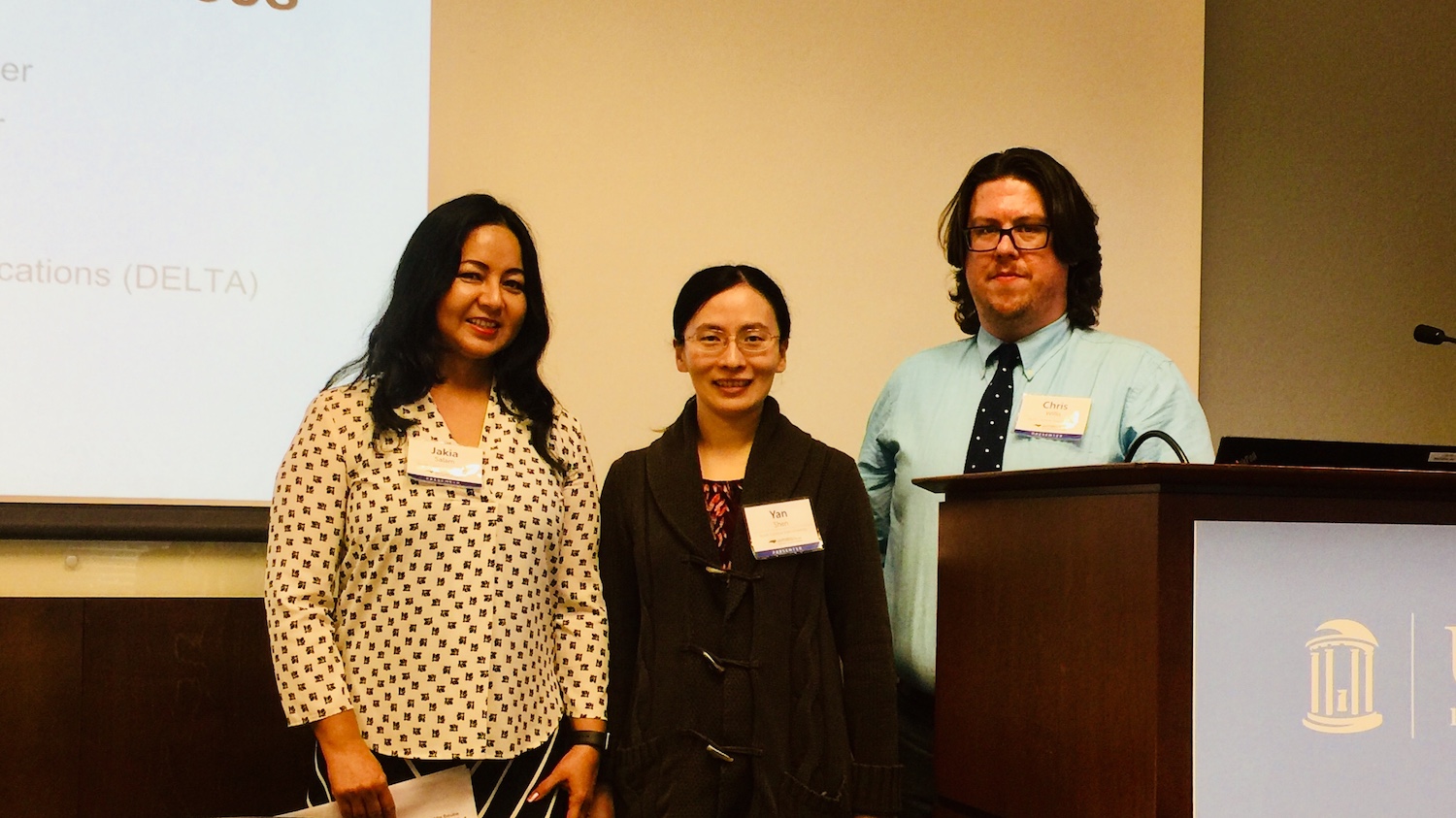DELTA Staff Share Flipped Learning Strategies at 2019 UNC System Student Success Conference

Article was written by DELTA staff Jakia Salam, Yan Shen and Chris Willis about their experience at the 2019 UNC Student Success Conference.
We (Instructional Designers Jakia Salam and Yan Shen and Coordinator of Learning Analytics and Assessment Chris Willis) presented a panel discussion with Dr. Cevdet Akbay from Fayetteville State University on the topic “Support Student Success in Flipped Classroom: Models, Strategies and Evidences.” We shared three flipped classroom models, including face-to-face partial flipping, face-to-face full flipping, and hybrid full flipping, from recent DELTA Grants projects and provided one example for each model (CE 332, CSC 116, and MA 231). We also shared a set of flipped classroom design strategies and discussed findings across the three courses regarding students’ level of acceptance, self-reported online learning behavior, in-class learning performance, and the impact flipping has on final learning outcomes.
Dr. Cevdet Akbay, who is a professor in Chemistry and Physics, presented on the Student-Centered Active Learning Environment with Upside-down Pedagogies (SCALE-UP) implemented in their undergraduate chemistry classrooms. Their results showed reduced DFW rates in the SCALE-UP sections compared with the traditional lecture sections, which was similar to our findings in the MA 231 course using the hybrid flipping model. We both observed increased peer learning in the redesigned courses from each institution. However, Dr. Cevdet Akbay’s research further investigated the impact of redesign on different student groups based on gender and race, whereas our study focused more on the comparison of student learning between early and late in the semester, and between flipped and non-flipped course structures.
The panel led to interesting discussions on the initial and continuing perceptions students have of flipped classrooms, and how student characteristics (age, race, major, etc.) can play a role in acceptance or hesitance. Attendees were engaged and excited to see data brought to the forefront of the discussion, and many expressed an interest in reconnecting for one-on-one chats.
Key Takeaways
Takeaways from Yan Shen: I attended a workshop titled “Leveling the Playing Field by Building Equitable Learning Environment” led by Dr. Kelly Hogan and Dr. Viji Sathy, who are award-winning instructors of large undergraduate courses at UNC Chapel Hill. They shared many strategies of adding structures to classroom activities to create an inclusive learning environment, especially for students from underrepresented groups. During a lunch conversation, Dr. Hogan also shared her experience of teaching flipped classroom courses and the reasoning of replacing the term “flipped classroom” with “high-structure active learning” to better connect with students.
Takeaways from Chris Willis: I attended a workshop called “Analyzing the Support Efforts for Special Populations” led by Karen Blackwell and Dr. Sarah Carrigan from UNC Greensboro’s Office of Institutional Research. They shared insights on the use of Propensity Score Analysis (PSA) and inverse propensity weights to estimate the causal effect of a treatment when you cannot randomly assign people to a treatment group. I think this tool could be useful in helping DELTA analyze pre- and post-redesign data across the number of DELTA grants projects we’ve implemented so far to examine impacts and trends, and I think a tool that helps us (by which I mean DELTA’s Planning and Assessment) apply research-based best practices to our applied course projects is a step in the right direction.
Takeaways from Jakia Salam: I attended a session on competency-based education “Professional and Faculty Development using a CBE Model” led by Krista P. Terry, Associate Professor, Instructional Design & Technology, and Michelle L. Solèr, Director, Competency-Based Education and Assessment. In the session, they discussed how they are helping and supporting faculty to understand competency-based programs and strategies they are undertaking to get faculty buy-ins. They reach out to faculty who are interested in implementing CBE in their curriculum and understand its potential in terms of student success. I thought this session was informative and aligns with the support we are providing for two College of Education programs in Training and Development (TD) and the Master of Arts in Teaching (MAT) on their initiative to implement CBE for both programs.
Finally, we interacted with attendees who serve different roles in the UNC system, such as professors, faculty development staff, academic advisors, career advisors, librarians, tutoring center staff, etc. Such experience helped us learned that there are a variety of departments on each campus that strive to support student success in their own capacities. We look forward to opportunities to communicate and collaborate with the equivalent roles at NC State in our future projects.
- Categories:


